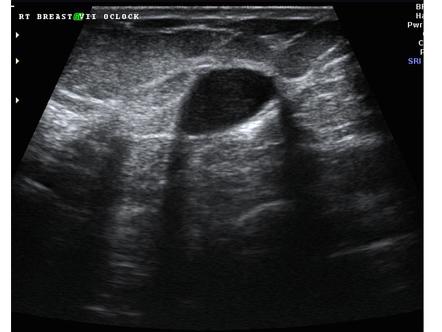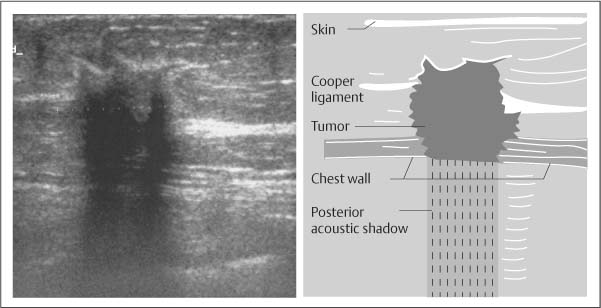Posterior acoustic shadowing is a suspicious finding and may be seen in cases of invasive carcinoma postoperative scar complex sclerosing lesion or macrocalcifications and may even be seen in patients with dense breast tissue. A variety of pathologic conditions are discussed with pathologic-imaging correlation.

Ultrasound Image Of A Breast Cancer With Irregular Borders Angular Download Scientific Diagram
Note also that the acoustic shadowing which is the dark black band posterior to the mass can be caused by productive fibrosis from the tumor and is often seen in masses that appear spiculated on the mammogram.

. As ultrasonic beams propagate through tissues there is a loss of energy by absorption reflection and scattering. If a breast lesion shows posterior acoustic shadowing on ultrasound this means that there is something about the mass or around the mass which attenuates reduces the sonic beam strength in comparison to normal adjacent tissues. The intense posterior acoustic shadow pro- duced by the whirled smooth muscle bundles of the nipple.
Which usually do not shadow. Fat Lobule The normal breast is composed of numer- ous fat lobules mixed with dense fibroglan- dular tissue. AbstractBreast ultrasound US in conjunction with digital mammography has come to be regarded as the gold standard for breast cancer diagnosis.
An irregular hypoechoic mass with intense posterior acoustic shadowing can be typically seen on US and can mimic breast malignancy Fig. Posterior acoustic features Fig 4 may or may not be seen when imaging solid masses. Although posterior acoustic shadowing is a sonographic feature that is most commonly associated with mammary malignancies this sonographic finding may also be seen with benign breast lesions.
You will be shown possible ultrasound correlates on the next slide and be asked to pick the best correlates and. Screen detected new mammographic mass Ultrasound is planned as the next step for this finding. Posterior acoustic shadowing is a suspicious finding and may be seen in cases of invasive carcinoma postoperative scar complex sclerosing lesion or macrocalcifications and may even be seen in patients with dense breast tissue.
When a lesion is homogeneous good through-transmission of the ultrasound beam is possible and malignant breast cancer. It is wider than tall with macrolobulations no calcifications and posterior acoustic shadowing. Although posterior acoustic shadowing is a sonographic feature that is most commonly associated with mammary malignancies this sonographic finding may also be seen with benign breast lesions.
On mammography the lesion usually shows localized increased density in the glandular tissue. Multiple projections from the nodule within or around ducts extending away from the nipple usually seen in larger tumors. Shadowing may result because of reflection of most of the energy by a large impedance discontinuity.
The lesions can be multiple and bilateral 23. On mammography the lesion usually shows localized increased density in the glandular tissue. It is a form of imaging artifact.
At sonography cross section of a fat lobule can be mistaken for a solid mass that is isoechoic to surrounding adipose tis-. Although posterior acoustic shadowing is a sonographic feature that is more commonly associated with breast malignancies this sonographic. D Magnified craniocaudal mammogram shows a spiculated mass arrow corresponding to the hypoechoic shadowing cancer.
Posterior acoustic shadowing is suspicious for breast cancer If a breast lesion shows posterior acoustic shadowing on ultrasound this means that there is something about the mass or around the mass which attenuates reduces the sonic beam strength in comparison to normal adjacent tissues. While breast US has certain advantages over digital mammography it suffers from image artifacts such as posterior acoustic shadowing PAS presence of which often obfuscates lesion margins. Inverted nipple mimics suspicious solid breast mass at sonography of 69-year-old woman.
What percentage of mammogram callbacks are cancer. It is a form of imaging artifact. What is posterior acoustic shadowing on breast ultrasound.
Citing Literature Volume 23 Issue 1 January 2004. Breast ultrasound US in conjunction with digital mammography has come to be regarded as the gold standard for breast cancer diagnosis. Hard irregular movable breast masses without pain are typical.
Posterior acoustic shadowing PAS can bias breast tumor segmentation and classification in ultrasound images. Sonographic imaging of submamillary tissue should be performed from an angled or coronal projection because of the intense posterior acoustic shadow produced by the whirled smooth muscle bundles of the nipple. Sonographic posterior acoustic shadowing.
Anyone have benign results with posterior acoustic shadowing brady0819 Upon a screening mammogram and ultrasound they found a 16 oval mass on my right breast. It is a form of imaging artifact. Transverse ultrasound of the left breast demonstrates an irregular antiparallel mass with posterior acoustic shadowing.
Posterior acoustic shadowing Non-circumscribed margins Non-palpable Controversial and age dependent Not new Case 3. DMP usually shows nonspecific parenchymal enhancement rather than an irregular enhancing mass on MRI. It is not possible to rule out malignancy here because posterior acoustic shadowing is not present.
Volume 23 Issue 1. While breast US has certain advantages over digital mammography it suffers from image artifacts such as posterior acoustic shadowing PAS presence of which often obfuscates lesion margins. This loss is displayed in the image as shadowing and is an important sonographic sign for the detection and diagnosis of breast disease.
An irregular hypoechoic mass with intense posterior acoustic shadowing can be typically seen on US and can mimic breast malignancy Fig. It is the posterior acoustic shadowing that is freaking me out. The phenomenon ofacoustic shadowing sometimes somewhat tautologically called posterior acoustic shadowing on an ultrasound image is characterized by a signal void behind structures that strongly absorb or reflect ultrasonic waves.
In this paper half-contour features are proposed to classify benign and malignant breast tumors with PAS considering the fact that the upper half of the tumor contour is less affected by PAS. View larger version 163K Fig. The phenomenon of acoustic shadowing sometimes somewhat tautologically called posterior acoustic shadowing on an ultrasound image is characterized by a signal void behind structures that strongly absorb or reflect ultrasonic waves.

Pdf Distinguishing Lesions From Posterior Acoustic Shadowing In Breast Ultrasound Via Non Linear Dimensionality Reduction Semantic Scholar

Mediconotebook Posterior Acoustic Shadowing And Enhancement

Transverse Ultrasound Of The Left Breast Demonstrates An Irregular Download Scientific Diagram

Basic Principles Radiology Key

Sonographic Evaluation Of Benign And Malignant Breast Masses Iame

Benign And Malignant Characteristics Of Breast Lesions At Ultrasound Radiology Reference Article Radiopaedia Org

Posterior Acoustic Shadowing In Benign Breast Lesions Weinstein 2004 Journal Of Ultrasound In Medicine Wiley Online Library

Posterior Acoustic Shadowing In Benign Breast Lesions Weinstein 2004 Journal Of Ultrasound In Medicine Wiley Online Library
0 comments
Post a Comment